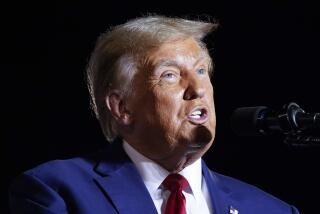Panel OKs Senate Radio, TV Broadcasts : Measure Allows Trial Period for Coverage, Faces Uncertain Future
- Share via
WASHINGTON — Radio and televised broadcasts of the Senate inched closer to reality Tuesday as the Senate Rules and Administration Committee voted overwhelmingly to allow radio and television into the stately chamber.
The committee-approved plan calls for gavel-to-gavel TV coverage of the Senate for an unspecified trial period. During that time, the broadcast would be seen only on an in-house, closed-circuit TV system. Cameras would be controlled by Senate employees and would focus only on members who are speaking, much the same way TV cameras now are used in the House of Representatives.
The gavel-to-gavel radio coverage also would be on a trial basis but would be available for public broadcast during the trial period.
‘Idea’s Time Has Come’
“This is an idea whose time has come,” said Sen. Minority Leader Robert C. Byrd (D.-W.Va.), who recently dropped his opposition to gavel-to-gavel television coverage. The proposal, however, faces an uncertain prospect on the Senate floor.
While the length of the test period would be determined later by Senate leaders, Byrd suggested that six months “would be ample time.”
The Senate has allowed television coverage of committee hearings for many years, but many members have balked at allowing cameras into the chamber on grounds that television would promote grandstanding and would alter dramatically the way the Senate functions. The House has allowed gavel-to-gavel TV coverage since 1979.
The broadcast resolution, approved 8 to 1 Tuesday, was offered by Sen. Albert Gore Jr. (D-Tenn.) and amended a broader measure introduced by Byrd. The committee voted for it while it was considering other changes in Senate procedures.
Dole Dissents
How soon the resolution will reach the Senate floor is uncertain, especially since Senate Majority Leader Bob Dole (R-Kan.) cast the lone dissenting vote. Dole was doubtful about the measure’s approval this year, saying: “It wasn’t on our must list.”
He said he objected to permitting the radio broadcasts to be aired to the public while TV coverage is being tested. “They ought to be on the same track,” Dole said.
New Voting System
In committee debate, Byrd also called for a new electronic voting system and for changes in procedures for conducting filibusters as well as in the custom of allowing frequent and time-consuming quorum calls to stall debate.
Sen. James A. McClure (R-Ida.) light-heartedly suggested that future TV viewers, during the tedious Senate quorum calls, might be treated to a “favorite philharmonic.” Sen. Wendell H. Ford (D-Ky.) expressed a preference for bluegrass music.
“Not cartoons,” added his colleague. “People might think they are watching the Senate.”
More to Read
Get the L.A. Times Politics newsletter
Deeply reported insights into legislation, politics and policy from Sacramento, Washington and beyond. In your inbox three times per week.
You may occasionally receive promotional content from the Los Angeles Times.










